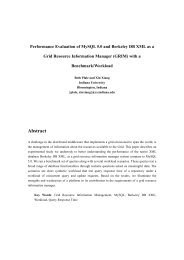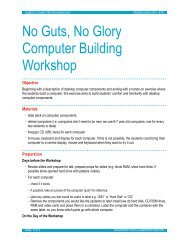Workshop Report - Pervasive Technology Institute - Indiana University
Workshop Report - Pervasive Technology Institute - Indiana University
Workshop Report - Pervasive Technology Institute - Indiana University
Create successful ePaper yourself
Turn your PDF publications into a flip-book with our unique Google optimized e-Paper software.
The goals of the workshop, reiterated from the introduction, were:<br />
• Suggest common elements of software stacks widely usable across nation/world to promote<br />
interoperability/economy of scale; and<br />
• Suggested policy documents that any research university should have in place.<br />
In response to these goals, the workshop participants put forward the following recommendations,<br />
each captured in their own subsection.<br />
4.1. The NSF should lead the establishment of a national CI support<br />
system<br />
Currently user support for CI is very distributed and uncoordinated, presenting scientists with a<br />
substantial challenge in finding unbiased expertise when going outside their institution. Programs<br />
such as the U.K. Campus Grid Special Interest Group [4], the NIH Knowledge Centers [5], and the<br />
TeraGrid Campus Champion [6] programs have shown promise in addressing this problem but are<br />
limited to specific CI projects and technologies.<br />
The workshop recommends that the NSF foster the establishment of a CI support system<br />
coordinated at the national level, comprised of expertise at campuses and CI projects, with sufficient<br />
vertical and horizontal coordination to allow for the routing of scientist’s problems with CI to the<br />
appropriate expert with minimal effort by the scientist and support staff. Such a program should<br />
particularly seek to foster expertise on campuses, close to scientists, with buy-in from campus<br />
leadership to ensure that support staff have their role appropriately prioritized.<br />
There are some unknowns in the exact methodology for such a service, but the participants agreed<br />
on some of its attributes:<br />
• It is important that the support service be both technology and project neutral so that scientists<br />
trust the service to provide answers that best support their science rather than providing success<br />
stories for CI providers.<br />
• A minimum investment to setting up such a service would be providing CI training (with travel<br />
expenses) and recognition to support staff. This would allow staff to develop both the technical<br />
expertise for answering user questions directly, along with the personal connections for finding<br />
the expertise for questions outside of their knowledge.<br />
• This service should provide a feedback mechanism for gathering and aggregating experiences<br />
from the scientists using the CI in order to provide feedback for the larger CI ecosystem as<br />
to both successes, to help with impact assessment, and frustrations, for recognizing where<br />
improvement is needed.<br />
18






